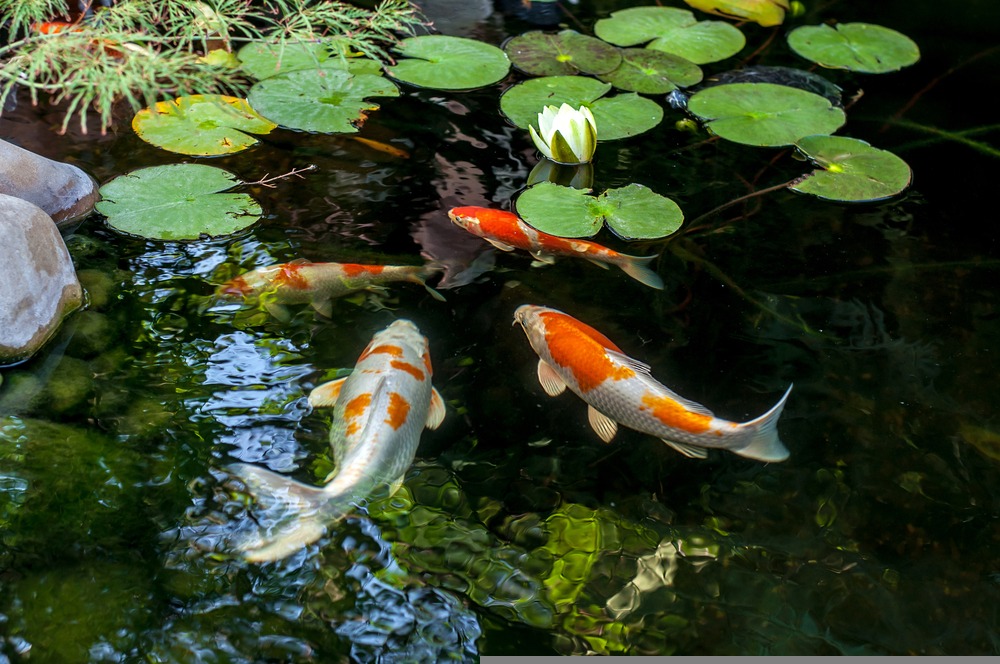The winter may still be a couple of months away, but it doesn’t mean you shouldn’t start taking some necessary steps towards preparing your garden.
After all, you need to take care of many things, from securing your plants to winterizing your landscape pond.
And while preparing your flowers, veggies, and shrubs for lower temperatures doesn’t sound too challenging, taking proper care of your pond is not a piece of cake.
Moreover, many people think it’s not necessary. Don’t make the same mistake.
And if you’re wondering how to prepare your garden pond for a winter season correctly, don’t worry.
You simply need to follow a few simple steps:
1. Clean Your Pond
Cleaning your pond before winter is absolutely crucial. If you leave too much organic material, your fish and other water organisms may not survive the season.
That’s why you should do it thoroughly. Removing some leaves from the surface is not enough.
Use a weed razor to trim your plants, and scoop out dead leaves and debris with a net. To make it more efficient, you can drain your pond halfway down.
Don’t forget to bring any tropical plants indoors, and remove some of them so that they don’t rot in water. Also, when filling the pond back, use freshwater and de-chlorinator.
A little piece of advice. If you want the whole cleaning process to be quicker and more effective, cover your pond with netting during the fall.
Also, depending on how dirty your water is, consider removing your fish for the time of cleaning.
And if you want to make sure the pond stays clean during the winter, consider using cold water bacteria. It will maintain the water’s purity and clarity, making your spring pond cleaning much more manageable.
2. Winterize Your Pond Pump
When it comes to taking care of your pond pump, you have two options:
You can either leave it running through the winter or remove it.
No matter which choice you make, don’t forget to clean it beforehand. But let’s discuss when to, or not, remove your pump.
If you live in a colder climate where the temperature falls really low, it’s highly recommended to remove the pond pump. If the water freezes, it may cause severe damage or even destroy the pump.
But if you know your pond won’t freeze, you can leave the pump running throughout the whole season. In mild climates, running water should prevent a pond from freezing and provide better aeration.
Still, you should be careful and pay attention to the weather.
You can also consider getting a winter pump, which is designed specifically for colder temperatures.
Sometimes, the right idea is to get a pond bubbler to keep the water’s correct amount of oxygen.
3. Take Care of Your Fish

Your pond fish may not be your best friends, but it doesn’t mean that you shouldn’t take proper care of them during the winter.
The question remains, can your fish survive the cold? Well, it depends on what kind of fish you have.
But let’s say you have goldfish (the most popular), or koi. If that’s the case, you don’t need to worry about them too much. They’ll survive the winter as long as the water doesn’t completely freeze.
To prevent that from happening, you can splash some cash and purchase a winter water pump. But if you feel it’s too expensive, a simple de-icer will do the trick.
They’re electric-powered floating discs that will ensure your fish get enough oxygen to live through the winter.
Okay, but what about feeding? Won’t your fish get hungry during the season? No, they won’t. They should live off by the natural flora within your pond.
But if you want to make sure they won’t starve, you can throw them some cold water fish food at the end of the fall.
Keep in mind, though, that you’ll have to overwinter them indoors if you have tropical fish. The good idea is to consult a specialist who’ll be able to tell you whether you can leave them in the pond, or if you need to take them indoors.
Conclusion
As you can see, winterizing your pond is not as challenging as it may sound.
And while, of course, to do that the right way you’re going to devote your time, if you implement the steps given above, you can be sure your pond will survive the winter.
Keep in mind that once you prepare your pond for winter, it doesn’t mean that you should stop caring about it.
The best idea is to check whether everything is okay once in a while, especially if you leave your water pump working.



Comments are closed.